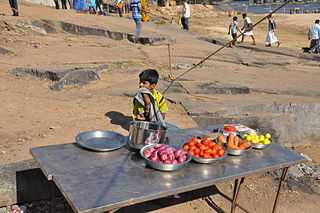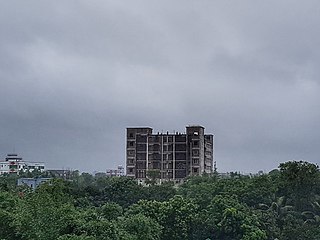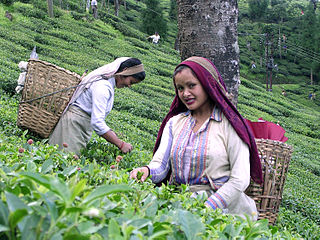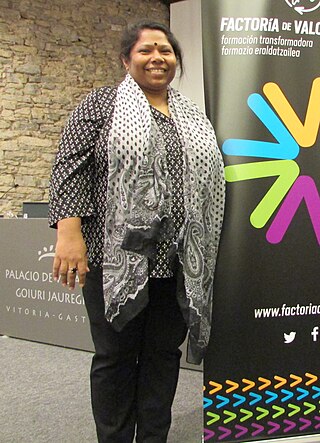Related Research Articles

The economy of Bangladesh is a major developing mixed economy. As the second-largest economy in South Asia, Bangladesh's economy is the 35th largest in the world in nominal terms, and 25th largest by purchasing power parity. Bangladesh is seen by various financial institutions as one of the Next Eleven. It has been transitioning from being a frontier market into an emerging market. Bangladesh is a member of the South Asian Free Trade Area and the World Trade Organization. In fiscal year 2021–2022, Bangladesh registered a GDP growth rate of 7.2% after the global pandemic. Bangladesh is one of the fastest growing economies in the world.

A sweatshop or sweat factory is a crowded workplace with very poor or illegal working conditions, including little to no breaks, inadequate work space, insufficient lighting and ventilation, or uncomfortably or dangerously high or low temperatures. The work may be difficult, tiresome, dangerous, climatically challenging, or underpaid. Employees in sweatshops may work long hours with unfair wages, regardless of laws mandating overtime pay or a minimum wage; child labor laws may also be violated. Women make up 85 to 90% of sweatshop workers and may be forced by employers to take birth control and routine pregnancy tests to avoid supporting maternity leave or providing health benefits.
Labor rights or workers' rights are both legal rights and human rights relating to labor relations between workers and employers. These rights are codified in national and international labor and employment law. In general, these rights influence working conditions in the relations of employment. One of the most prominent is the right to freedom of association, otherwise known as the right to organize. Workers organized in trade unions exercise the right to collective bargaining to improve working conditions.

The term ethical trade first gained currency in the mid-1990s, where it was used as a term for socially responsible sourcing. Ethical trade addresses the ethical aspects of organisations including worker welfare, agricultural practice, natural resource conservation, and sustainability of the environment. Since then, numerous multinational organisations have adopted ethical trade policies by outsourcing to auditing companies to monitor the conditions of workers in their supply chains. The leading alliance of these companies, trade unions and non-governmental organisations is the Ethical Trading Initiative. to support business

The textile and clothing industries provide a single source of growth in Bangladesh's rapidly developing economy. Exports of textiles and garments are the principal source of foreign exchange earnings. By 2002 exports of textiles, clothing, and ready-made garments (RMG) accounted for 77% of Bangladesh's total merchandise exports. Emerging as the world's second-largest exporter of ready-made garment (RMG) products, Bangladesh significantly bolstered employment within the manufacturing sector.

The 2012 Dhaka garment factory fire broke out on 24 November 2012, in the Tazreen Fashion factory in the Ashulia district on the outskirts of Dhaka, Bangladesh. At least 117 people were confirmed dead in the fire, and over 200 were injured, making it the deadliest factory fire in the nation's history. The cause of the fire was not determined. It was initially presumed to be caused by an electrical short circuit, the cause of 80% of factory fires in Bangladesh. A widely criticized government report alleged an act of "sabotage", without identifying who committed it or why. This fire and others similar to it have led to numerous proposed reforms in workers' rights and safety laws in Bangladesh.

The Rana Plaza collapse occurred on 24 April 2013, when the eight-storey Rana Plaza commercial building collapsed due to a structural failure. The search for survivors ended on 13 May 2013, with a confirmed death toll of 1,134. Approximately 2,500 injured people were rescued from the building. It is considered to be one of the deadliest structural failures in modern human history, as well as the deadliest garment-factory disaster in history, and is the deadliest industrial accident in the history of Bangladesh. Amnesty International called it "the most shocking recent example of business-related human rights abuse."

Clothing industry or garment industry summarizes the types of trade and industry along the production and value chain of clothing and garments, starting with the textile industry, embellishment using embroidery, via the fashion industry to apparel retailers up to trade with second-hand clothes and textile recycling. The producing sectors build upon a wealth of clothing technology some of which, like the loom, the cotton gin, and the sewing machine heralded industrialization not only of the previous textile manufacturing practices. Clothing industries are also known as allied industries, fashion industries, garment industries, or soft goods industries.

Export-oriented employment refers to employment in multinational corporations' international industrial factories, usually located in developing countries. Such factories produce goods and services for sale in other countries. While these multinational producers have globally expanded women's access to employment, evidence suggests they do so by reinforcing traditional gender roles or creating new gender inequalities. Such gender inequities allow multinational firms to greater exploit profits per worker than they would otherwise due to the decreased labor cost. This decrease in the cost of labor comes as a result of the relegation of women to certain occupations. Studies show that in the quest for lower unit labor costs, export-oriented facilities create poor working conditions.
Bangladesh Homeworkers Women Association, also known as BHWA, is an NGO, headquartered in Dhaka, Bangladesh. It is mostly known for working with the underprivileged homeworkers, also known as home-based workers by initiating social awareness programs, advocacy workshops, originating policy drafts, development and recommendation. BHWA focuses on key issues such as the elimination of child labour, female labourers' rights in the informal sector, occupational health and safety for women workers who are not covered by the Labour Code in Bangladesh.

Kalpona Akter is a labour activist from Bangladesh. She is the founder and executive director of the Bangladesh Center for Workers Solidarity and was awarded Human Rights Watch's Alison Des Forges award for Extraordinary Activism in 2016.
The Bangladesh Garment Workers Trade Union Centre (GWTUC) is a trade union federation of garment workers in Bangladesh. It is one of the largest trade unions in that sector, with more than 20 factory trade unions affiliated to it. It has enough members to be formally recognised as a trade union, but does not have that status, as is not uncommon for left-oriented unions in Bangladesh. Politically, GWTUC is aligned with the Communist Party of Bangladesh.
The Garment Workers Unity Forum (GWUF) is a national trade union federation of garment workers in Bangladesh.
The National Garment Workers Federation (NGWF) is a registered national trade union federation of garment workers in Bangladesh. With 87 registered factory unions, it ifs considered one of the four main federations of garment workers' unions. NGWF is the initiator and a member of the Bangladesh Garments Workers Unity Council and a member of the Bangladesh Center for Workers' Solidarity. It is affiliated with the IndustriALL Global Union and one of the signatories of the Bangladesh Accord.
The Bangladesh Independent Garment Workers Union Federation (BIGUF) is a trade union federation of garment workers in Bangladesh. It is considered one of the four main federations of garment workers' unions. BIGUF is affiliated with the IndustriALL Global Union and a member organisation of the Bangladesh Center for Workers Solidarity. It is also one of the signatories of the Bangladesh Accord. Unlike many other trade unions in Bangladesh, it is explicitly not affiliated with any political party.
The Bangladesh Garments Workers Unity Council (BGWUC) is a national trade union centre in Bangladesh. The centre unites 21 garment worker trade union federations.
Joly Talukder is the current general secretary of the Bangladesh Garment Workers Trade Union Centre (GWTUC).
Mushrefa Mishu is a Bangladeshi trade unionist and politician. She is the current president of the Garment Workers Unity Forum and general secretary of Bangladesh's Democratic Revolutionary Party.
The Cambodian Alliance of Trade Unions (CATU) is a trade union federation of manufacturing workers in Cambodia. The federation was founded in 2011 and is affiliated with the Cambodian Confederation of Unions and IndustriALL Global Union.
Syed Sultan Uddin Ahmed is a Bangladeshi activist and chairman of the Labor Reform Commission of the Yunus ministry. He is the executive director of the Bangladesh Institute of Labour Studies. He is a workers rights specialist for the International Labour Organization. He was the coordinator of the Domestic Workers' Rights Network, affiliated with the International Domestic Workers Federation.
References
- ↑ "History & Background". Bangladesh Institute of Labour Studies. Retrieved 2020-12-13.
- ↑ Labour Market Profile Bangladesh - 2020 (PDF) (Report). Danish Trade Union Development Agency. p. 8.
- ↑ Rahman, Zia; Langford, Tom (2012). "Why labour unions have failed Bangladesh's garment workers". In Mosoetsa, Sarah; Williams, Michelle (eds.). Labour in the Global South. Challenges and Alternatives for Workers (PDF). ILO. p. 100. ISBN 978-92-2-126239-8.
- ↑ Abdullah Al Faruque (2009). Current Status and Evolution of Industrial Relations System in Bangladesh (PDF) (Report). ILO. p. 42.
- ↑ Murshida Akter Nahar. "Domestic Workers in Bangladesh" (PDF). ITUC . Domestic Workers' Rights Network. Retrieved 2021-01-04.
- ↑ Siddiqua, Fayeka Zabeen (2016-05-13). "Maid in Bangladesh". The Daily Star . Retrieved 2021-01-04.
- ↑ Rana Plaza 3 Years On: Compensation, Justice, Workers' Safety (Report). Clean Clothes Campaign. p. 2.
- ↑ "Factories don't follow standards for work-hour, study finds". The Daily Star. 2017-05-30. Retrieved 2021-01-04.
- ↑ "They toil for 12 hours a day, not 8". The Daily Star. 2017-05-01. Retrieved 2021-01-04.
- ↑ "16 young trade union leaders trained". The Daily Star. 2017-10-30. Retrieved 2021-01-04.
- ↑ "Abolish limits on workers' participation: experts". The Daily Star. 2018-10-08. Retrieved 2021-01-05.
- ↑ "Benefits elude workers with no job contracts". The Daily Star. 2018-12-20. Retrieved 2021-01-05.
- ↑ Jahan, Nilima (2019-02-10). "Pulling the weight of the world". The Daily Star. Retrieved 2021-01-05.
- ↑ Parvel, Sohel (2020-05-01). "More than a crore with no job and hope". The Daily Star. Retrieved 2021-01-05.